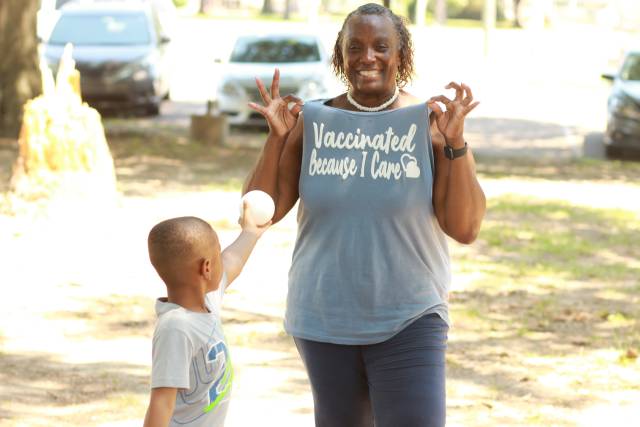You are here
Supporting Community Power to Address the COVID-19 Pandemic for Non-Hispanic Black People Living in the South
The COVID-19 pandemic shed light on longstanding health and social inequities and the disparities Black people face. These include lack of access to appropriate healthcare settings, health testing, treatment and vaccines, as well as food insecurity and less access to employment, housing and education. In response, the Centers for Disease Control and Prevention (CDC) and CDC Foundation partnered with universities and community-based organizations (CBO) in the southeastern United States to create the Southern Alliance, a collaborative initiative to address COVID-19 and health disparities caused or exacerbated by the pandemic.
In 2020, the Southern Alliance worked to inform the non-Hispanic Black community about COVID-19 transmission and protective measures. CDC Foundation partners Albany State University (Albany, GA), Jackson State University (Jackson, MS), Tulane University (New Orleans, LA), University of Mississippi Medical Center (Jackson, MS) and Xavier University of Louisiana (New Orleans, LA) worked with community organizations, community members and place-based initiatives to disseminate locally relevant and accurate information about the pandemic. They convened online forums, developed communication tools and used their platforms to share information across communities.
In 2021, the CDC Foundation was awarded a grant to continue the Southern Alliance project for a second year. Southern Alliance 2.0 focused on amplifying the work of CBOs through capacity building. The new partnership model includes eight new CBO partners who were selected to address gaps in COVID-19 response and the related impact on underserved Black communities. The CBOs develop and disseminate public health and COVID-19 information as well as provide health navigation, personal protective equipment (PPE) and other resources to support the unique needs of their priority populations. In addition to their programmatic priorities, which range from arts and culture and youth development to mental health, reproductive health and access to healthcare in rural communities, each CBO also supports distinct populations, including the LGBTQIA+ community, students, doulas and community health workers in the South. Additional partners selected to support the CBOs include eight subject matter experts that help the CBOs develop, implement and evaluate their community-based initiatives, one with a specific focus on tailoring communications for each CBO and their priority population.
To date, the CBOs have trained over 100 doulas and community health workers to include COVID-19 education within their care models of support. Health education communication efforts via social media and billboards has reached over 400,000 impressions, and over 28,480 additional people were reached through local events and health navigation support. Together, the CBOs have distributed over 75,000 pieces of PPE and assisted 120 people in getting vaccinated.
The Southern Alliance 2.0 project highlights the power and importance of elevating local leadership within communities. CBOs use their expertise, lived experience and knowledge of historical injustices to address COVID-19 misinformation and vaccine hesitancy, improve access to care and disseminate critical health information and resources in non-Hispanic Black communities. This understanding and experience helps to improve health and saves lives.
This blog post is supported by the Centers for Disease Control and Prevention of the U.S. Department of Health and Human Services (HHS) as part of a financial assistance award totaling $4,600,000 with 100 percent funded by CDC/HHS. The contents are those of the author(s) and do not necessarily represent the official views of, nor an endorsement, by CDC/HHS, or the U.S. Government.


